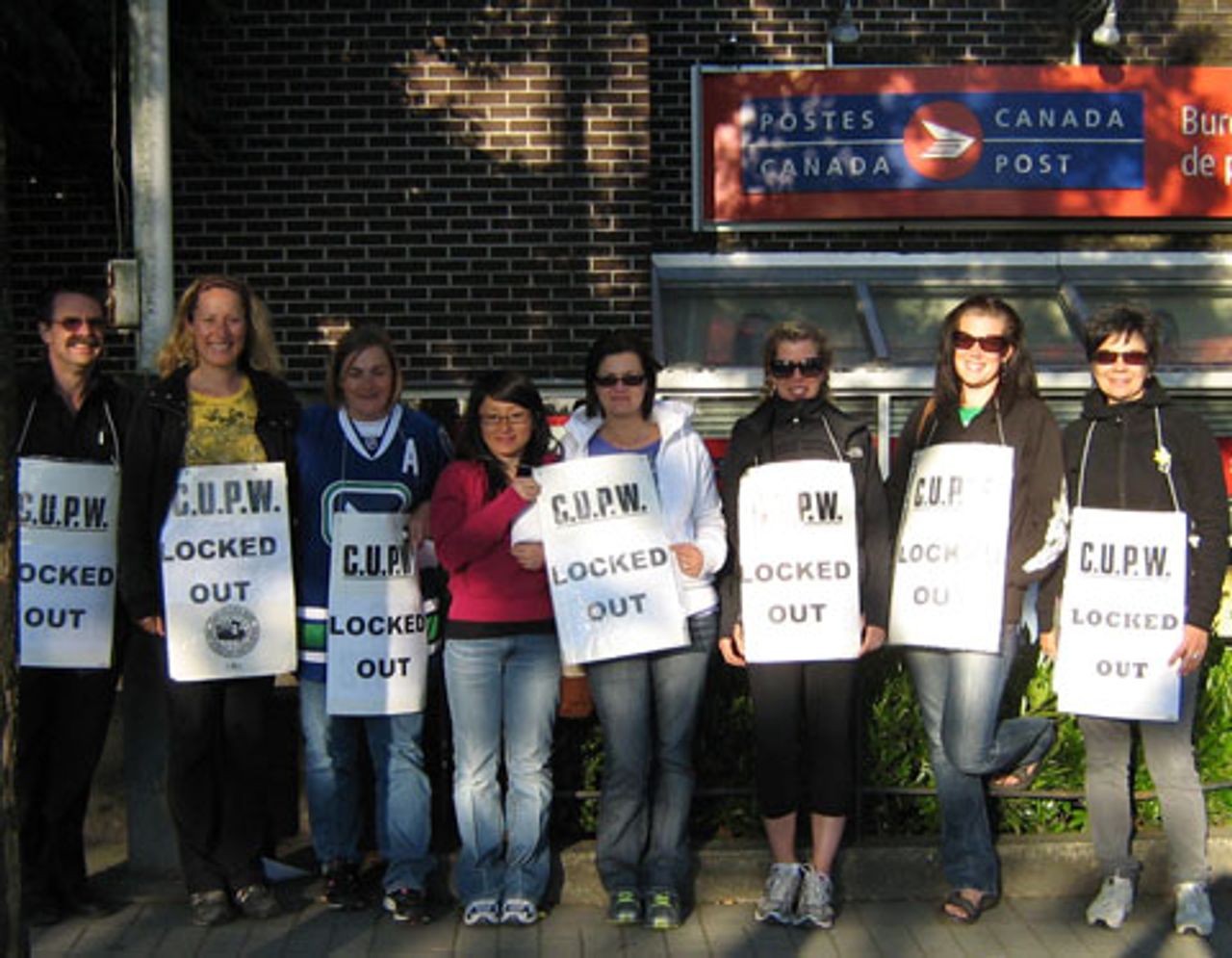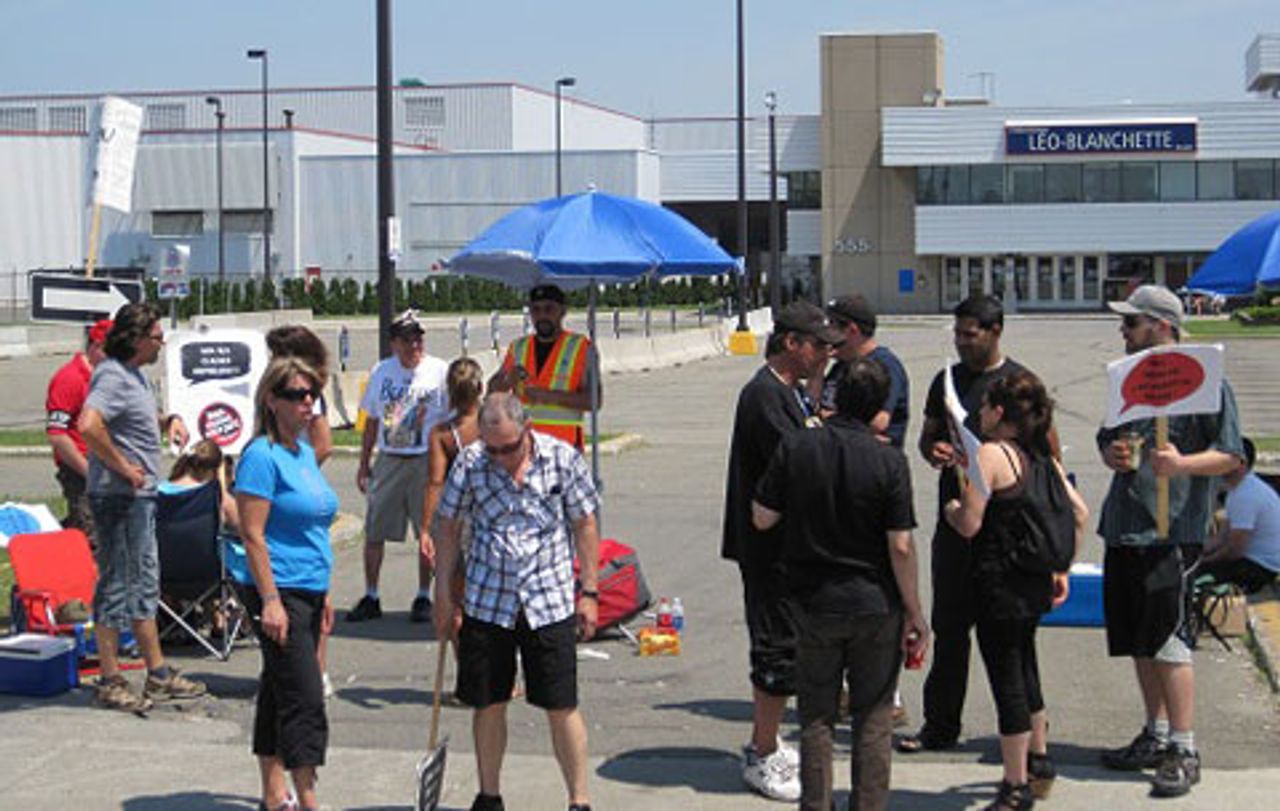Reporters from the World Socialist Web Site visited postal-worker picket lines in Vancouver, Toronto and Montreal this week, distributed articles from the web site, and held discussions with workers interested in a socialist analysis of their fight with Canada Post and the Conservative government.
 Locked out postal workers in Surrey, British Columbia
Locked out postal workers in Surrey, British ColumbiaForty-eight thousand letter carriers, mail sorters, delivery truck drivers and clerks, represented by the Canadian Union of Postal Workers (CUPW), have been involved in job action against Canada Post—a federal government-owned Crown Corporation—since June 3. After twelve days of rotating localized walkouts, Canada Post instituted a full, nation-wide lockout of the workers late Tuesday night. The following afternoon, the Conservative government of Prime Minister Stephen Harper gave notice in parliament that it intends to introduce back-to-work legislation, illegalizing all job action by postal workers and suspending their collective bargaining rights, at the earliest date parliamentary rules permit—next Monday.
Throughout the dispute, the CUPW leadership has bent over backwards to avoid a confrontation with the company and the Conservative government, although postal workers are facing sweeping concession demands and had given far and away the strongest strike mandate in the union’s nearly five-decade history. Canada Post is demanding an almost 20 percent reduction in the starting pay of new employees, cuts to sick benefits, changes in work rules, the elimination of jobs through mechanization, and implementation of hazardous new mail sorting and delivery systems.
On Tuesday evening, just prior to the announcement of the nationwide lockout, two hundred workers gathered for a rally at Toronto’s South-Central letter sorting station on Eastern Avenue. The plant is the largest letter-mail processing facility in the country. Over nine million pieces of mail are sorted there every day, almost half of the nation’s total.
Prior to the beginning of a series of brief speeches by an assortment of full-time union bureaucrats, strikers had kept up a chant of “Negotiate, Don’t Legislate” in reference to rumblings that the government was preparing back-to-work legislation to end worker resistance to the company’s concession demands. Reporters for the WSWS wanted to hear the opinions of workers regarding the possibility of a government-legislated end to their dispute and to discuss with them the necessity of answering such an attack by making their strike their spearhead of a political mobilization of the entire working class against big business and the Conservative government.
 Locked out postal workers picketing the main mail-sorting plant in Montreal
Locked out postal workers picketing the main mail-sorting plant in MontrealWhile workers were generally quite cognizant of the contractual issues under negotiation, most had little to say when asked how they thought they should respond to a move to illegalize their strike. “We haven’t heard anything on that,” said one curtly. “If they send us back, morale would be pretty bad,” said another. An older worker just shrugged. “That’s what they did to us in ’97. [In 1997 the Liberal government of Jean Chretien used legislation to break the last national postal workers’ strike.] We weren’t happy about it, but what can you do?”
If workers had few solid ideas about a strategy to resist an overt government intervention to criminalize their resistance to Canada Post’s concession demands, this was because CUPW, the Canadian Labour Congress, and trade union-supported New Democratic Party had maintained studious silence on the issue so as to ensure that workers would be unable to organize defiance of strikebreaking legislation.
Although the workers’ chant raised the threat of a government back-to-work law, the assembled union officials continued to avoid addressing how workers should prepare to meet such a challenge. Speaker after speaker took the microphone—Jim Cartwright, president of the 160,000 strong Toronto District Labour Council, Jim Innis from the City of Toronto’s CUPE Local 416, Tim McGuire representing inside city workers and several local CUPW officials—and offered the usual platitudes that from the union officials’ mouths are invariably the sub-text for impending betrayal: “Canada Post’s demands are unfair,” “This is an all-out attack on workers,” “With solidarity we can win this,” “We offer you our full support.” None of the speakers explained how a body of officials collectively representing over 160,000 workers had failed to bring any of them along to the rally.
It was left to Ontario Federation of Labour president Sid Ryan to broach the subject of strike tactics. Standing the traditional concept of industrial action on its head, CUPW officials had bragged to the press and their membership that their strategy of localized, one-day rotating walkouts was not designed to significantly disrupt Canada Post’s operations. By Tuesday’s rally, rank-and-file workers had begun to question the efficacy of this strategy to the extent that Ryan felt compelled to address the matter head-on. “The strategy implemented by (CUPW National President) Denis Lemelin is nothing less than masterful,” declared Ryan. “He is running a masterful strike. A very, very intelligent action not greatly impacting the service and not alienating the public but still pressuring Canada Post…And if the government announces an anti-strike law it just goes to show you the importance of the political process and electing a party that represents workers like Peter Tabuns (of the New Democratic Party) who is here today …”
Ryan’s bombast drew applause, but also a grunt of disgust from one worker. Approached by the WSWS, he identified himself as Jim but refrained from providing his last name for fear of victimization. “That Ryan is some piece of work,” said Jim. “He’s a big NDP’er and he’s selling a bill of goods. Why doesn’t he say how the NDP voted for strike-breaking legislation against city workers, against the subway drivers and the teachers. What a crock of shit. That guy Tabuns and his pals have voted more than once to break a strike.”
The following day, the WSWS visited a picket line in Surrey, British Columbia in suburban Vancouver. There the workers—now locked out by the company and under threat of imminent back-to-work legislation— deferred all questions to their local union president, Stephen Gale. Gale was quite articulate in laying out the issues at the bargaining table. “We’re not looking for any gains. We just want to keep what we have with maybe a minor improvement. The biggest issues are health and safety, single bundle delivery, sick leave and of course the two-tier system. We think Canada Post has a great future if it uses its massive network all over Canada to expand business and get postal banking and financial services like in New Zealand and Europe to offset falling letter volumes…But Canada Post is looking to privatize and de-regulate. They did that in the Netherlands and now there’s virtually no full-time postal employees left.”
Gale vigorously defended the rotating strike strategy of his superiors in the union bureaucracy. “We’re trying to have as little impact on the public as possible,” he declared. But Gale was less articulate when questioned about a strategy to resist the now impending back-to-work legislation. After a long pause, he stammered, “At this point in time there has been no discussion on how we want to deal with back-to-work legislation. If it becomes a reality next week I’m sure we’ll be informed on how we might deal with it.”
The workers the WSWS spoke with at the main Montreal-area sorting plant were outraged by the Conservative government’s blatant attack on their democratic rights and support for Canada Post’s concession demands. Several expressed reservations and criticisms of the union’s decision to limit job action. But CUPW shop steward and picket captain Paul Éthier vigorously defended the rotating strike strategy as a means of averting a back-to-work law: “We knew that what the employer wanted is that we go out on a general strike because the government would then impose a special (strikebreaking) law. We decided not to play their game … The union decided to go with a rotating strike because we knew it would be an automatic special law with Harper.”
When the WSWS reporters raised the need to defy the coming legislation and appeal to the entire working class for support in a political struggle to bring down the Harper government and defend jobs, wage and public services, Éthier suddenly made an about-face. “The law won’t be against us. We want to return to work. We have been locked out.”
Subscribe to the IWA-RFC Newsletter
Get email updates on workers’ struggles and a global perspective from the International Workers Alliance of Rank-and-File Committees.
